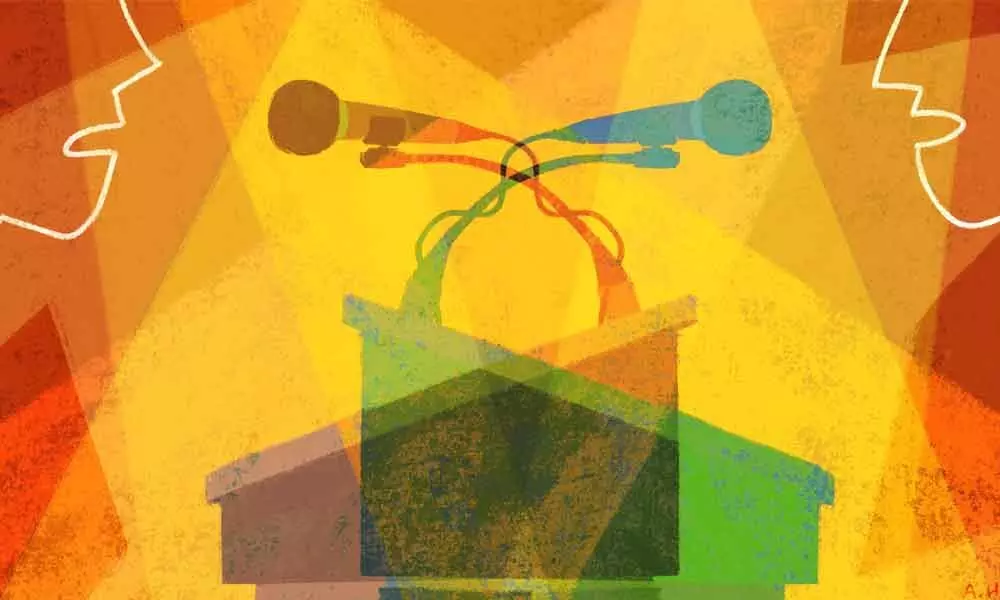Live
- GMR Airports Unveils AI-Powered Digital Twin Platform to Transform Airport Operations
- India poised to become leading maritime player: PM Modi
- Top Causes of Kidney Stones and How to Recognize Silent Symptoms
- India’s renewable energy capacity logs 14.2 pc growth at 213.7 GW
- Winter Session of Odisha Assembly adjourned sine die
- Biden calls Trump's tariff approach 'major mistake'
- After Drama Over Eknath Shinde’s Chief Minister Race, Maharashtra Cabinet Formation Faces New Tensions
- Egyptian FM, Blinken discuss recent developments in Syria
- Iran's supreme leader says Syria's developments result of US-Israeli 'plot'
- Elon Musk to Purchase $100 Million Luxury Mansion Next to Donald Trump's Mar-a-Lago, Report Reveals
Just In
Debates on high tables alone do not make good governance


Everyone is in favour of good governance. But what exactly does it mean?
Everyone is in favour of good governance. But what exactly does it mean? Is it what the party in power says or is it the assessment of various factors the governance has contributed to? Should it be promoted in order to enhance democracy?
Or to create markets? Should we look only at formal institutions or also at civil society? Beyond the technical definitions lies a much more complex political debate, involving notions that are usually not considered by politicians and policy makers. Here is where the Modi government is lacking in its understanding of the ground realities of criticism.
It has become too sensitive to criticism. But they should realise that good governance is a whole package. It is about governance modules, policies, impact on society and job opportunities, development and the free air it creates for ideas to clash and transmit without the fear of bringing down the government.
Democracy is a modern concept which is still being explored. Having said that, we must also admit that the quest for 'good' governance is a key theme of most multilateral and bilateral policies. Debates on high tables tend to focus on which aspects of governance should be promoted, or on whether good governance precedes or follows from economic development.
Underlying these policy debates is a discussion on development itself. The criteria that are used as indicators of good governance vary enormously, indicating that countries are not neutral.
By choosing particular sets of governance criteria, these countries, are in fact making more political choices. Let us talk in terms of donor countries (of aid) to simplify the whole issue.
As anthropologist James Ferguson famously demonstrated, development practitioners will sometimes go to great lengths to translate intrinsically political realities of poverty and powerlessness into 'technical problems' awaiting solution by 'development' agencies.
A key marker in the debate on good governance was the publication in 1998 of a report entitled Assessing Aid: What Works, What Doesn't, and Why, by David Dollar and Paul Collier of the World Bank.
Despite heavy criticism at the time, the report's central argument has since gained wide acceptance. In essence, the report argued that aid is most effective in an environment in which 'good' governance is practised, while development assistance to countries with 'bad' governance only helps to maintain the underlying causes of poverty and deprivation.
The message for development policy makers was that a reallocation of aid to (very poor) countries with good governance would achieve just as much as a tripling of aid budgets to the countries already receiving aid.
This is a point the Centre should seriously take note of before being critical of either countries or agencies or individuals. Even the UK's Department for International Development (DFID) which commissioned its economic policy and research department to verify the results of the investigation, concluded that the gains of reallocating aid to countries with 'good governance' were indeed potentially highly significant.
So if there are calls for downgrading India on some scale or so, several aspects go into it. So a slogan is different from development. The narrative has to change and become really inclusive to achieve the goals of good governance.

© 2024 Hyderabad Media House Limited/The Hans India. All rights reserved. Powered by hocalwire.com






